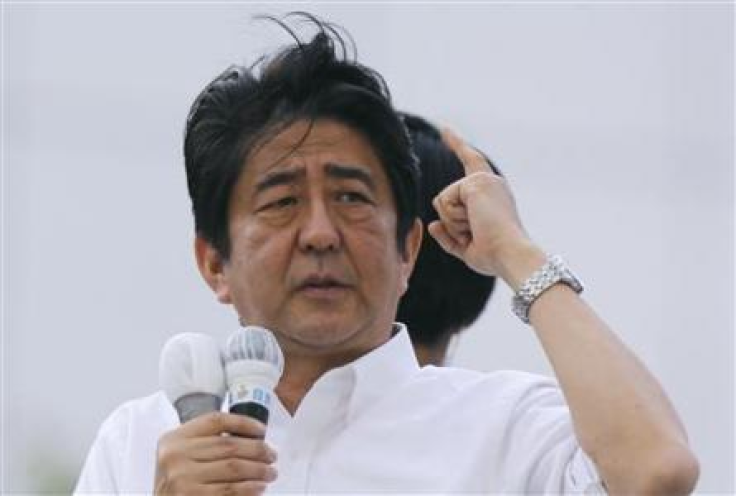Japan’s Wartime Behavior Still Complicates Relations With Asian Neighbors; How Much Apologizing Is Enough?

Nearly 70 years after the end of World War II, the “history issue” still comes between Japan and the countries in Asia that it invaded, hindering efforts at reconciliation. For example, Japanese Prime Minister Shinzo Abe recently angered South Korea and China yet again when he dedicated an offering to the Yasukuni Shrine, a controversial Shinto religious site that honors Japan’s war dead, including 12 Class A war criminals from World War II.
When Japan’s critics argue that the nation has not apologized for its World War II-era atrocities, they often ignore the fact that Japan signed a series of bilateral agreements in the 1950s and 1960s with Southeast Asian governments on wartime compensation. These agreements sometimes took the form of technological or economic assistance, but it was understood that they were meant to serve as wartime compensation.
Moreover, when Japan and South Korea signed a treaty in 1965 normalizing diplomatic relations, they also signed a separate agreement for Japan to provide financial aid to Seoul, in return for South Korea relinquishing its right to claim wartime compensation. Likewise, the Chinese government relinquished its right of pursue claims for wartime compensation after gaining the possession of Japanese assets in China at the end of the war.
In addition, the Asia Women’s Fund -- established by the Japanese government and financed by government and private donations -- presented cash compensation and implemented other assistance for the “comfort women” who were forced to submit to sex with Japanese soldiers during the war.
What about apologies? During his visit to China in 1992, Japanese Emperor Akihito expressed his “deep grief” for Japan’s wartime aggression against that nation.
Then in 1995, Japanese Prime Minister Tomiichi Murayama issued an official statement that said: “Japan … through its colonial rule and aggression, caused tremendous damage and suffering to the people of many countries, particularly to those of Asian nations…. I … express here once again my feelings of deep remorse and state my heartfelt apology.” This statement has been honored by all of his successors as Japan’s official position.
Given all these accounts, the criticism that “Japan has not apologized” is simply inaccurate. On top of this, Japan has paid millions of dollars to neighboring countries and has suffered in many others ways for its militarism and wartime behavior.
Why, then, does the criticism continue? The problem lies in the recurrence of the three incidents: Visits to the Yasukuni Shrine by high-profile Japanese politicians; revisionist statements by ultra-conservative Japanese politicians; and the Japanese government’s approval of the textbook that takes a revisionist position on the history of World War II.
The criticism from China and South Korea -- and even from some in the United States -- against Japan’s actions in World War II has intensified since Abe, a conservative, came to power in December 2012. Recently, behavior by Abe and other Japanese political leaders has been criticized as a sign that Japan is going back to the aggressive, militaristic and authoritarian behavior that brutalized Asia in the World War II era.
What is not understood is that these Japanese political leaders’ behavior is often frowned upon by the ordinary Japanese themselves. The Japanese today are proud of Japan’s post-war achievements, but they do not glorify Japan’s wartime behavior. The fact that the Asia Women’s Fund raised more than 5 million yen from the private donations of ordinary Japanese shows the sense of responsibility the Japanese people still harbor for the behavior of their parents, grandparents and great-grandparents.
At the same time, Japanese today are questioning how much apologizing is enough. In a 2005 poll conducted by the newspaper Yomiuri Shimbun, more than 60 percent replied Japan had apologized sufficiently. A recent public opinion poll, in which more than half of the respondents thought Abe should visit the Yasukuni Shrine, is quite telling. Japanese support Abe’s visit not because they glorify their nation’s wartime conduct, but because they believe foreign countries should not be allowed to dictate how Japan remembers its war dead.
Obviously, Japanese leaders should refrain from taking actions that nullify their government’s reconciliation efforts. Moderates in Japan should be more vocal in expressing their discomfort with problematic actions by some Japanese political leaders, as well as articulating their view of history and their belief in Japan’s responsibility to the world.
At the same time, those who bash Japan for not atoning enough should take a moment to consider the measures that the Japanese government has taken over the years. In many cases, the foreign governments that were the recipients of Japanese assistance have failed to explain to their people that this aid was compensation for Japanese wartime aggression. Otherwise, acquiescing to Japan-bashing on the “history issue” will only alienate the moderate Japanese who, if empowered, can be strong advocates in facilitating Japan’s reconciliation in Asia.
Yuki Tatsumi is senior associate at Stimson Center, a nonprofit and nonpartisan international security think tank. She formerly served as special assistant for political affairs at the Embassy of Japan in Washington. She is a co-author of “Opportunity Out of Necessity: the Impact of US Budget Reduction on the US-Japan alliance (Stimson, forthcoming) and “Global Security Watch: Japan” (Praeger: 2011).
© Copyright IBTimes 2024. All rights reserved.











